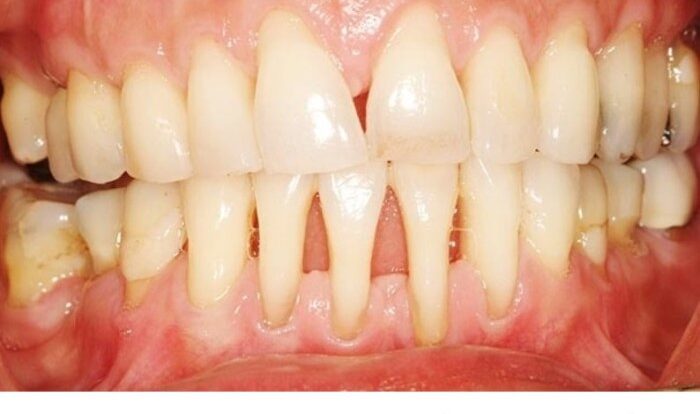
As gum disease affects millions worldwide, understanding how to cure gum disease without a dentist is crucial. This guide delves into the realm of home remedies, natural treatments, and alternative therapies, empowering you with the knowledge to combat this common dental issue effectively.
From the comfort of your home to the latest advancements in alternative medicine, discover the myriad of options available to restore your gum health and maintain a radiant smile.
Home Remedies for Gum Disease
Gum disease, also known as periodontal disease, is a common condition that affects the gums and the bones that support the teeth. It can cause a variety of symptoms, including bleeding gums, swelling, pain, and tooth loss.
There are a number of home remedies that can help to treat gum disease. These remedies can help to reduce inflammation, kill bacteria, and promote healing. However, it is important to note that home remedies should not be used as a substitute for professional dental care.
Salt Water Rinse
Salt water is a natural antiseptic that can help to kill bacteria and reduce inflammation. To make a salt water rinse, dissolve 1/2 teaspoon of salt in 8 ounces of warm water. Rinse your mouth with the salt water for 30 seconds, then spit it out.
Salt water rinses are safe to use several times a day.
Tea Tree Oil
Tea tree oil is an essential oil that has antibacterial and anti-inflammatory properties. It can be used to treat gum disease by killing bacteria and reducing inflammation.
To use tea tree oil for gum disease, add 2-3 drops of tea tree oil to a cup of warm water. Swish the tea tree oil around your mouth for 30 seconds, then spit it out.
Tea tree oil can also be used to make a mouthwash. To make a tea tree oil mouthwash, add 10 drops of tea tree oil to 8 ounces of water. Swish the mouthwash around your mouth for 30 seconds, then spit it out.
Tea tree oil is safe to use several times a day.
Coconut Oil
Coconut oil is a natural antibacterial and anti-inflammatory agent. It can be used to treat gum disease by killing bacteria and reducing inflammation.
To use coconut oil for gum disease, apply a small amount of coconut oil to your toothbrush. Brush your teeth as usual, then spit out the coconut oil.
Coconut oil can also be used to make a mouthwash. To make a coconut oil mouthwash, add 1 tablespoon of coconut oil to 8 ounces of warm water. Swish the mouthwash around your mouth for 30 seconds, then spit it out.
Coconut oil is safe to use several times a day.
Aloe Vera
Aloe vera is a natural anti-inflammatory agent. It can be used to treat gum disease by reducing inflammation and promoting healing.
To use aloe vera for gum disease, apply a small amount of aloe vera gel to your toothbrush. Brush your teeth as usual, then spit out the aloe vera gel.
Aloe vera can also be used to make a mouthwash. To make an aloe vera mouthwash, add 1 tablespoon of aloe vera gel to 8 ounces of warm water. Swish the mouthwash around your mouth for 30 seconds, then spit it out.
Aloe vera is safe to use several times a day.
Turmeric
Turmeric is a natural antiseptic and anti-inflammatory agent. It can be used to treat gum disease by killing bacteria and reducing inflammation.
To use turmeric for gum disease, mix 1/2 teaspoon of turmeric powder with 1/4 cup of water. Apply the mixture to your gums and teeth, and leave it on for 5 minutes. Rinse your mouth with water.
Turmeric can also be used to make a mouthwash. To make a turmeric mouthwash, add 1 teaspoon of turmeric powder to 8 ounces of warm water. Swish the mouthwash around your mouth for 30 seconds, then spit it out.
Turmeric is safe to use several times a day.
Table: Comparison of Home Remedies for Gum Disease
The following table compares the effectiveness of different home remedies for gum disease:
| Remedy | Effectiveness |
|---|---|
| Salt water rinse | Effective for killing bacteria and reducing inflammation |
| Tea tree oil | Effective for killing bacteria and reducing inflammation |
| Coconut oil | Effective for killing bacteria and reducing inflammation |
| Aloe vera | Effective for reducing inflammation and promoting healing |
| Turmeric | Effective for killing bacteria and reducing inflammation |
Natural Treatments for Gum Disease: How To Cure Gum Disease Without A Dentist
Gum disease, a prevalent oral health concern, can be effectively addressed using natural remedies. These remedies harness the therapeutic properties of plants and supplements to alleviate symptoms, reduce inflammation, and promote oral health.
If you’re wondering how to cure gum disease without a dentist, there are a few things you can do. First, you can try rinsing your mouth with salt water. You can also try using a mouthwash that contains chlorhexidine. If these methods don’t work, you may want to consider visiting San Diego Mecconline for professional treatment.
They offer a variety of services, including gum disease treatment. You can also try using a toothpaste that contains fluoride. Fluoride helps to strengthen teeth and prevent cavities.
Natural treatments for gum disease encompass a wide range of approaches, including herbal remedies, supplements, and lifestyle modifications. Their efficacy is supported by scientific evidence, indicating their potential to improve gum health.
Herbal Remedies
Herbal remedies have been traditionally used to treat gum disease due to their antibacterial, anti-inflammatory, and antioxidant properties. Some commonly employed herbs include:
- Green tea:Rich in polyphenols, green tea exhibits antibacterial and anti-inflammatory effects, reducing plaque formation and improving gum health.
- Echinacea:Possessing immunostimulatory properties, echinacea enhances the body’s immune response, aiding in the fight against gum disease.
- Myrrh:Known for its antiseptic and anti-inflammatory properties, myrrh helps reduce inflammation and promotes tissue healing in the gums.
Oral Hygiene Techniques for Gum Disease Prevention
Maintaining good oral hygiene is crucial in preventing gum disease. Regular brushing and flossing help remove plaque and bacteria that can accumulate on teeth and gums, leading to inflammation and infection. By following proper oral hygiene techniques, you can significantly reduce your risk of developing gum disease.
Brushing Techniques, How to cure gum disease without a dentist
- Use a soft-bristled toothbrush and replace it every 3-4 months.
- Brush your teeth twice a day for at least 2 minutes each time.
- Hold the toothbrush at a 45-degree angle to your gum line.
- Use gentle circular motions to brush all surfaces of your teeth, including the insides, outsides, and chewing surfaces.
- Be sure to brush your tongue to remove bacteria and freshen breath.
Flossing Techniques
- Use dental floss or a water flosser to clean between your teeth.
- Floss at least once a day, preferably before bed.
- Gently slide the floss between your teeth and move it up and down along the sides of each tooth.
- Do not snap the floss into your gums, as this can damage them.
- Use a new section of floss for each tooth to avoid spreading bacteria.
Lifestyle Factors and Gum Disease
Lifestyle factors play a significant role in maintaining gum health. Certain habits and dietary choices can contribute to or protect against gum disease. Understanding these factors and making positive lifestyle changes can help prevent and manage gum disease.
Let’s explore the impact of diet, smoking, and stress on gum health, along with specific recommendations for a healthy lifestyle that supports gum health.
Diet and Gum Disease
A healthy diet provides essential nutrients that support gum health. Conversely, a diet deficient in certain nutrients or high in processed foods can increase the risk of gum disease.
- Fruits and Vegetables:Rich in vitamins, minerals, and antioxidants, fruits and vegetables promote gum health by strengthening the immune system and reducing inflammation.
- Whole Grains:Whole grains are a good source of fiber, which helps remove plaque and bacteria from the teeth.
- Dairy Products:Calcium and vitamin D in dairy products support strong teeth and bones, which are essential for healthy gums.
- Processed Foods and Sugary Drinks:Processed foods and sugary drinks are high in sugar, which can feed harmful bacteria in the mouth and contribute to gum disease.
Smoking and Gum Disease
Smoking is one of the most significant risk factors for gum disease. Nicotine and other chemicals in cigarettes damage the immune system, making it harder for the body to fight off gum infections.
- Gum Disease Progression:Smoking increases the severity and progression of gum disease, making it more difficult to treat.
- Delayed Healing:Smoking impairs blood flow to the gums, which can delay healing and increase the risk of gum recession.
- Increased Plaque:Smoking increases plaque buildup, which can lead to gum inflammation and infection.
Stress and Gum Disease
Stress can indirectly contribute to gum disease by weakening the immune system and affecting oral hygiene habits.
- Weakened Immune System:Stress can suppress the immune system, making it harder for the body to fight off gum infections.
- Poor Oral Hygiene:Stress can lead to poor oral hygiene habits, such as skipping brushing or flossing, which can increase the risk of gum disease.
- Increased Cortisol:Stress releases the hormone cortisol, which can break down gum tissue and increase inflammation.
Alternative Therapies for Gum Disease

Alternative therapies offer non-conventional approaches to treating gum disease. While they are not a substitute for professional dental care, they may provide complementary support or address specific concerns.
Acupuncture
Acupuncture involves inserting thin needles into specific points on the body. For gum disease, it is believed to stimulate the body’s healing response, reduce inflammation, and improve blood flow to the gums.
Laser Therapy
Laser therapy uses low-level lasers to promote tissue regeneration and reduce inflammation. It can be used to target specific areas of the gums and promote healing after scaling and root planing procedures.
Ozone Therapy
Ozone therapy involves using ozone gas to disinfect the gums and kill bacteria. It is thought to have antimicrobial and anti-inflammatory effects, and may be used as an adjunct to traditional periodontal treatments.
Closing Summary
Whether you opt for natural remedies, incorporate lifestyle changes, or explore alternative therapies, the path to gum disease recovery lies within your reach. Remember, consistency and a proactive approach are key to achieving lasting results. Embrace the knowledge gained from this guide and embark on a journey towards a healthier, more confident smile.
Q&A
Can I cure gum disease without professional help?
While professional dental care is recommended, home remedies and lifestyle changes can help manage gum disease symptoms and prevent further progression.
What are the most effective home remedies for gum disease?
Saltwater rinses, tea tree oil, and baking soda are among the commonly used home remedies known for their antibacterial and anti-inflammatory properties.
Is it possible to prevent gum disease?
Maintaining good oral hygiene, avoiding sugary foods and drinks, and quitting smoking can significantly reduce the risk of developing gum disease.





